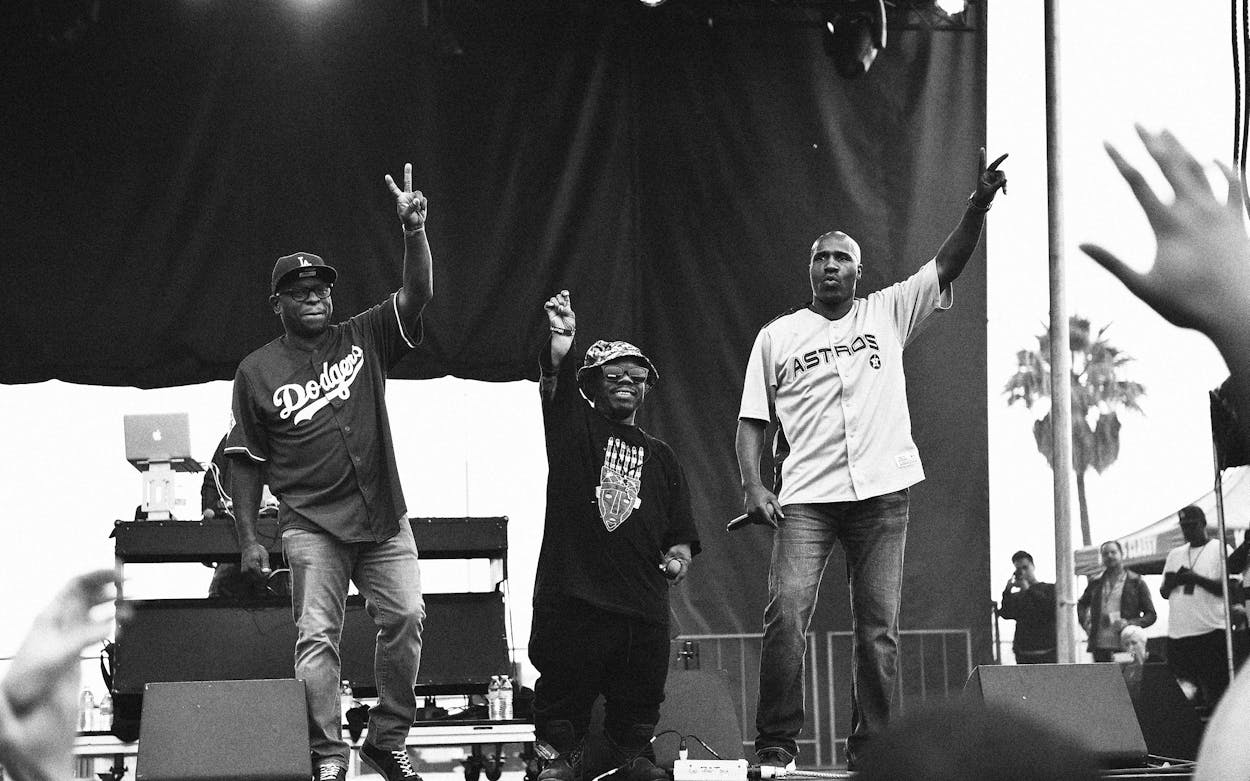“We always instructed,” says rapper Willie D, a.k.a. William James Dennis, a.k.a. longtime member of the legendary Houston rap group the Geto Boys, midway through the first episode of the new podcast Geto Boys Reloaded. “We didn’t just talk about the struggle. We gave you a blueprint on how to get through the struggle.” It’s a fair summation of the ethos of the Geto Boys, whose lyrics—beneath all their street-corner paranoia and slasher-movie violence—probed the many systemic problems plaguing cities like their own. Now that credo serves as a mission statement for the podcast that Dennis hosts with fellow Geto Boys veteran Scarface, a.k.a. Brad Jordan. Geto Boys Reloaded, part of media mogul Charlamagne Tha God’s The Black Effect Podcast Network, is still about the struggle, only now Dennis, Jordan, and their guests are exploring more actionable, uplifting ways to overcome it.
If your familiarity with the Geto Boys comes only through hits like “Mind Playing Tricks on Me” or “Damn It Feels Good to Be a Gangsta,” you might be surprised at the group’s sudden turn toward community outreach. (But also, go listen to those songs again, because you might have missed their messages about mental health, civic duty, and political corruption.) Yet Dennis and Jordan’s evolution from Southern shock rappers to sage elder statesmen has been a long time in the making. Dennis emerged years ago as an exceptionally prolific social commentator on his YouTube channel, Willie D Live, where he weighs in on everything from Black Lives Matter to celebrity gossip to trashy tabloid stories. Jordan, for his part, ran unsuccessfully in 2019 for Houston City Council in District D, after founding a youth education group, the Positive Purpose Movement. They’re natural leaders, out to encourage and empower their community with hard-won wisdom and the occasional ugly truth.
Geto Boys Reloaded continues their bid to instruct, with Dennis and Jordan taking on hard, heady topics and eschewing easy nostalgia and industry chatter at every turn. Its July 5 premiere found them talking to Houston hip-hop guru J. Prince, founder of the Rap-A-Lot label, about the Geto Boys’s early days, but it was primarily about the value of self-respect that Prince had instilled in the group, which saved them and so many others from a dead end of drugs and delinquency. A July 12 episode with author and activist Dr. Boyce Watkins briefly touched on the political villainization of hip-hop, but it was more broadly about the marginalization of Black voices. The July 19 episode with Kathy Griffin, a human trafficking official for Harris County, delved deeply into prostitution and sexual abuse, barely touching on music at all.
Geto Boys Reloaded has already shot to the top of Apple’s music podcast charts, but what sets it apart from its closest competitors is that the music feels almost incidental. It’s not a reverie on hip-hop’s golden age, nor is it about the Geto Boys taking potshots at the current scene. Whenever the subject comes around to modern hip-hop, Dennis and Jordan shy away from offering specific criticism, shrugging off any hint of disapproval as a matter of generational difference. Instead of calling out younger rappers for their superficiality, Jordan laments that the Geto Boys, along with other venerable artists of their generation, such as Ice Cube and Dr. Dre, probably share some of the blame for not doing more to mentor them.
Jordan actually seems to be over music entirely. He tells Watkins that he’s “done,” insisting that he doesn’t even listen to his own tracks anymore. This podcast is the only Geto Boys “reunion” he’s interested in—which is understandable. After the group lost the charismatic emcee Bushwick Bill in 2019, the Geto Boys essentially ceased to be. Just a couple of days after Bill’s death, Jordan went so far as to tell the Washington Post, “Scarface is dead.” It’s clear that Jordan isn’t interested in rehashing his hip-hop past. And while future episodes promise chats with artists like 2Chainz and Slim Thug, right now neither he nor Dennis seems especially eager to engage with its present either.
Thus far, Dennis and Jordan remain graciously but firmly committed to the issues at hand, always redirecting the focus away from themselves. As a result, the initial run of episodes has sometimes felt less like a freewheeling conversation with two of hip-hop’s greatest than a motivational speaker conference—just one where people cite Ice Cube instead of Steve Jobs. Again, it’s understandable. Dennis and Jordan are more than just the music they made; as Jordan told the Washington Post, he’s committed to writing the next chapter of his life in public service. (“I’m not going to be a seventy-five-year-old rapper,” he said.) But their reluctance to step outside their staid mentor roles and delve into their own story also means they tend to disappear behind their guests.
As hosts, Dennis and Jordan have an easy, entertainingly volatile chemistry, contradicting and breezily insulting each other the way that only two lifelong sparring partners can. And the immense respect their guests clearly have for them guarantees smart discussions and provocative takes. Yet as edifying as their show can be, it’s in the moments when they drop the lesson plan and allow a bit more of themselves to come through that Geto Boys Reloaded approaches the fearlessness and personality you’d expect from them. Here’s hoping future episodes will bring a bit more of the music to the message, the way the Geto Boys always did, and turn this promising start into another phenomenon.






